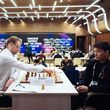No Right to Change Move Order
Classical Game Three of the Gelfand – Inarkiev match in the Review of Vladimir Barsky
On Monday, the temperature in Nazran went above 40 degrees. However, the Palace of Culture, hosting the event, maintained a comfortable environment: the hall with tightly curtained windows stayed pretty cool, three fans tirelessly sweeping the air back and forth. Ernesto Inarkiev, playing Black, changed his "opening song" by refusing from the English Opening in favor of the classical Queenside Gambit. At first it seemed is though the experiment was a failure as White was about to achieve a substantial edge, but Boris Gelfand made a hasty move and allowed his opponent to get away in one piece.
Gelfand – Inarkiev
Queen’s Gambit Declined
1.c4 e6 2.Nc3 d5 3.d4 Be7 4.cxd5 exd5 5.Bf4 Nf6 6.e3 Bf5 7.Qb3 Nc6 8.a3 Na5 9.Qa2 c6 10.Nf3 b5 11.Be2 0-0 12.Ne5
12.0-0 Nc4 (12...h6 13.h3 Rc8 14.Rac1 Nc4 15.a4 b4 16.Nb1 Na5 17.Nbd2 Qb6 18.Nb3 Nxb3 19.Qxb3 a5 20.Rfd1 Rfd8, as in Peralta – Fridman, Rabat 2015) 13.Rfc1 Nh5 14.Be5 f6 15.Bg3 Nxg3 16.hxg3 Rb8 17.Nd1 Qd7 18.a4 a6 19.Ne1 Nb6 20.b3, as in Mamedyarov – Fridman, Khanty Mansyisk 2011.
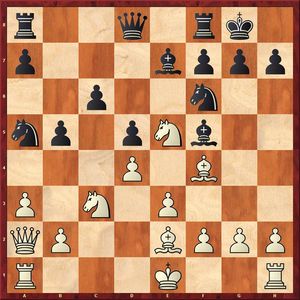
12...Qb6 13.0-0 Nc4 14.a4 a6
“We have handled the opening into a rare line of the Queen’s Gambit Declined. The classical players would have likely disapproved of Black’s plan with Na5, c6, b5; however, there is certain logic behind it as the white queen is boxed in on a2. I believe my play has been rather consistent, whereas Ernesto has come up with an underwhelming 12…Qb6 (better is 12...Rc8), and after 13.0-0 Nc4 14.а4! Black has got issues to solve. Now 14…b4 fails to 15.a5 Qb7 16.a6! (an important intermezzo since otherwise Black throws in b4-b3, and my queen’s getting trapped is not out of the question) 16…Qc8 17.Bxc4 dxc4 18.Ne2” (B. Gelfand).
15.axb5 cxb5
Losing is 15...axb5 16.Qxa8 Rxa8 17.Rxa8+ Bf8 18.Rfa1; but now Black ends up with a weak d5-pawn.
16.Bg5 Be6
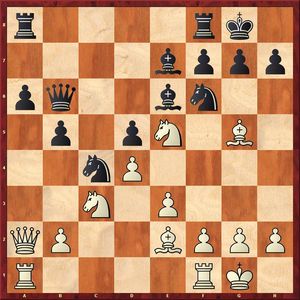
17.b3?
“After 16.Bg5 Black’s position is difficult, but I have erred by changing a move order. I needed to play 17.Nd3 instead. I wanted to displace the black knight and missed 17…Nxe5 18.dxe5 Bb4!, which gives Black counterplay. It seems to me that after 17.Nd3 Black’s position is very precarious, objectively speaking. It is hard to imagine how the d5-pawn is not falling; even if Black manages to keep the pawn alive, he is going to end up with a poor coordination of pieces as he will need all of them to accomplish that task“ (B. Gelfand).
17…Nxe5!
Worse by far is an immediate 17...Bb4 in view of 18.Na4 bxa4 19.bxc4 Ne4 20.Bd3 Nxg5 21.cxd5 Bc8 22.f4, whereas 17...Nd6 18.Bf3 gives rise to exactly the type of position Gelfand has been striving at with Black chained down to passive defense of the d5-pawn.
18.dxe5 Bb4
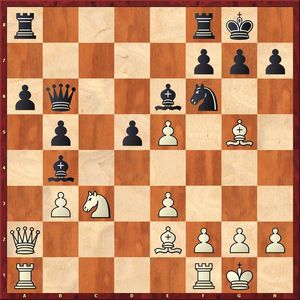
19.Na4
In the case of 19.exf6 Bxc3 20.fxg7 Bxg7 21.Rad1 Rac8 22.Bf3 d4 Black is also close to equality.
19...bxa4 20.exf6 axb3 21.Qxb3 d4 22.Qb2
It seems like the most reliable continuation. After 22.Qb1 Bc5 (22...g6!?) 23.Qe4 Rfe8 or 22.Qd3 g6 23.exd4 a5 the game escalates markedly.
As opposed to that, Inarkiev is able to bring forth further simplifications now.
22...Bc5 23.Qxb6 Bxb6 24.fxg7 Kxg7
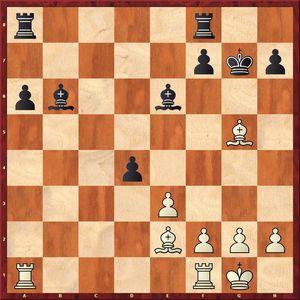
25.Bxa6
“After 18…Bb4 Black is out of the woods. I could have played more cagy, perhaps, but could not find anything promising. Black’s margin of safety is very substantial here, many lines giving him an option to liquidate into a drawn endgame down a pawn (this is exactly what has happened in the game, by the way). Alternatively, Black is going to be compensated by his remote passer.
This was, perhaps, the last opportunity to keep up the game with 25.Rfb1!? Bc5 26.Rc1 Bb4!? 27.exd4 a5. I think this position is closer to a draw than anything, although White retains definite winning chances. Therefore, I had to go for it” (B. Gelfand).
25...dxe3 26.fxe3 f6 27.Bf4 Rf7 28.Be2 Rxa1 29.Rxa1 Bc7 30.Bf3 Bxf4 31.exf4 Rd7 32.Ra5 Rd4 33.Ra6 Bf7 34.Ra7 Kf8 35.g3 Rd2 Draw.
* * *
In a classical time-control game, opponents get two points for a victory and one for a draw; in rapid - one and half a point respectively. Thus, the score in the match has become 5:5 (4:2 in Gelfand’s favor in the classical chess and 3:1 in Inarkiev’s favor in the rapid).




















